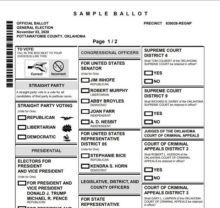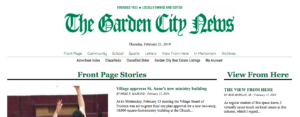 The Wet Mountain Tribune filed a federal lawsuit last month accusing the local Board of County Commissioners (BOCC) of punishing it by awarding Custer County’s public notice contract to another newspaper. The lawsuit alleges the BOCC violated the Tribune’s First Amendment rights by retaliating against it for reporting factual matters the Board would have preferred to keep hidden.
The Wet Mountain Tribune filed a federal lawsuit last month accusing the local Board of County Commissioners (BOCC) of punishing it by awarding Custer County’s public notice contract to another newspaper. The lawsuit alleges the BOCC violated the Tribune’s First Amendment rights by retaliating against it for reporting factual matters the Board would have preferred to keep hidden.
The paper appears to have a very strong case.
Wyoming municipalities opt out of state’s public notice laws
 There’s a nascent movement of counties asserting their right not to enforce laws they believe violate the U.S. Constitution. Although the Constitution explicitly states federal law is “the supreme law of the land,” public officials in these counties say they can ignore federal edicts that run counter to their interpretation of the founding document.
There’s a nascent movement of counties asserting their right not to enforce laws they believe violate the U.S. Constitution. Although the Constitution explicitly states federal law is “the supreme law of the land,” public officials in these counties say they can ignore federal edicts that run counter to their interpretation of the founding document.
That spirit of rebellion has reached into the realm of public notice laws this year in Wyoming, where two municipalities in Natrona County recently claimed the right not to run notices in their local newspapers despite state laws requiring them to do so.
Ballot measures, council vote nullified over notice issues
 Five proposals to amend the City Charter of Tahlequah, Okla., were nullified last year as a result of the city’s failure to publish the city ballot in an official newspaper, according to the Tahlequah Daily Press.
Five proposals to amend the City Charter of Tahlequah, Okla., were nullified last year as a result of the city’s failure to publish the city ballot in an official newspaper, according to the Tahlequah Daily Press.
The mistake was discovered prior to the Nov. 3 election when a local resident contacted the Daily Press and alerted the paper to the missing ballots. The City Council later voted to keep the questions on the ballot to survey voters about the issues they raise.
PNRC contest winners’ concerns often disregarded by officials
Take Crosby, North Dakota, population 1,300, for instance. It’s located in the upper northwest corner of the state, approximately 35 miles east of Montana and six miles south of the Canadian border. Many folks there have an extraordinary interest in the public notices published in the local paper, the Journal.
“Sometimes we get calls from people aware of something happening in town and wondering why a notice about it wasn’t published in the paper,” says Cecile Wehrman (pictured on left in photo above), the Journal’s editor and publisher.
Local officials use public notice as tool of vengeance
 After 30 years of serving as the official newspaper in Gardner, Kansas, the local paper is calling foul following the town’s decision to pull its public notices and place them in another publication with no print circulation in Gardner.
After 30 years of serving as the official newspaper in Gardner, Kansas, the local paper is calling foul following the town’s decision to pull its public notices and place them in another publication with no print circulation in Gardner.
“The council members are trying to punish me because they don’t like the way I have been covering the city,” said Rhonda Humble, owner and publisher of The Gardner News. “They are trying to shut me up.”
Voters in Connecticut town eliminate newspaper notice on second try
 Don’t like the outcome of a referendum? No problem. Just put the same issue back on the ballot in the next election, only this time leave out the part that voters objected to the first time.
Don’t like the outcome of a referendum? No problem. Just put the same issue back on the ballot in the next election, only this time leave out the part that voters objected to the first time.
That’s what the Board of Selectmen did last month in the town of Winchester, Connecticut, after voters rejected a 2018 ballot initiative that would have moved the town’s public notices from local newspapers to its website.
When the city learns what the county is doing by reading the notices
 The City of Hobart, Indiana, is suing a local restaurant owner after learning he breached a mortgage agreement for the purchase of the old Hobart Police Department building in the city’s downtown area (that’s downtown Hobart on the left), according to The Times of Northwest Indiana.
The City of Hobart, Indiana, is suing a local restaurant owner after learning he breached a mortgage agreement for the purchase of the old Hobart Police Department building in the city’s downtown area (that’s downtown Hobart on the left), according to The Times of Northwest Indiana.
It’s a complicated story that is part of The Times’ larger investigation of corruption in Lake County’s tax sale process (see editorial below). It caught our eye for one reason. The city learned it was being cheated by reading notices published by Lake County, Indiana in a local newspaper. Here’s how the Times put it:
City pulls notices after critical coverage
 A New York Times story reports on a move by the Garden City, N.Y. village board to take public notices out of a local newspaper and start running them in a smaller competitor.
A New York Times story reports on a move by the Garden City, N.Y. village board to take public notices out of a local newspaper and start running them in a smaller competitor.
It’s the latest attempt by government officials to use economic pressure to try to sway coverage.
Meg Morgan Norris, editor and publisher of the 8,300-circulation Garden City News, has been critical of the village board’s handling of the redevelopment of a local landmark.
In addition to cutting the notices, the village board also has threatened to stop sending news items like calendar listings and senior columns to the News.
Voters Go to the Polls to Select Official Newspapers in N.D.
See the post-election postscript at the end of this post.  If we had a category in our annual Public Notice Journalism Contest for best lede, Jack Dura of the Bismarck Tribune would probably win with this one: “Races for official county newspaper don’t usually headline election years, but a few papers around North Dakota could flip in this cycle.”
If we had a category in our annual Public Notice Journalism Contest for best lede, Jack Dura of the Bismarck Tribune would probably win with this one: “Races for official county newspaper don’t usually headline election years, but a few papers around North Dakota could flip in this cycle.”
It turns out that in North Dakota, when a county has at least two newspapers local voters often get to decide which one is designated to serve as the official publisher of notice. It appears to be the only state that designates official newspapers by ballot.
Newspaper Notice Saves County “Tens of Thousands of Dollars”
 CVS Caremark recently charged Wapello County, Iowa, $198.22 for a bottle of generic antipsychotic pills dispensed by a local pharmacy. CVS reimbursed the pharmacy just $5.73 for the pills.
CVS Caremark recently charged Wapello County, Iowa, $198.22 for a bottle of generic antipsychotic pills dispensed by a local pharmacy. CVS reimbursed the pharmacy just $5.73 for the pills.
We know about this enormous markup because one of the owners of the pharmacy, Mark Frahm, read a public notice in the local Ottumwa Courier and did some sleuthing. Frahm’s investigation ultimately had a significant impact that continues to reverberate. Locally, it led the county jail to drop CVS as its pharmacy benefit manager (PBM) and purchase meds directly from Frahm’s South Side Drug. The move is “expected to save the county tens of thousands of dollars,” according to the Courier.

